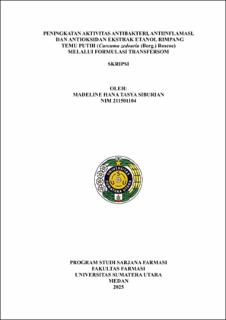Peningkatan Aktivitas Antibakteri, Antiinflamasi, dan Antioksidan Ekstrak Etanol Rimpang Temu Putih (Curcuma Zedoaria (Berg.) Roscoe) melalui Formulasi Transfersom
Enhancement of Antibacterial, Anti-Inflammatory and Antioxidant Activities of Ethanol Extract of Rhizome White Temu (Curcuma zedoaria (Berg.) Roscoe) by Transfersome Formulation

Date
2025Author
Siburian, Madeline Hana Tasya
Advisor(s)
Yuandani, Yuandani
Banjarnahor, Sofna Dewita Sari
Metadata
Show full item recordAbstract
Background: Skin diseases affect 30–70% of the global population, with microbial infections being a major issue exacerbated by increasing resistance to conventional treatments. The skin microbiome, including Staphylococcus aureus and Propionibacterium acnes, can trigger an inflammatory response. Chronic inflammation increases free radical production and may lead to serious complications. Natural therapy using Curcuma zedoaria has shown promising antibacterial, anti-inflammatory, and antioxidant potential as an alternative treatment.
Objective: This in vitro study aimed to formulate transfersomes containing Curcuma zedoaria extract and evaluate their characteristics and bioactivity as antibacterial, anti-inflammatory, and antioxidant agents.
Methods: Transfersomes were formulated using the thin-film hydration method at two concentrations (0.25% and 0.5%). Antibacterial activity was assessed by determining MIC and MBC against S. aureus and P. acnes. Anti-inflammatory activity was evaluated through protein denaturation inhibition, while antioxidant potential was measured by IC₅₀ values in DPPH and ABTS assays. The formulations were also characterized for particle size, polydispersity index, zeta potential, entrapment efficiency, and pH.
Results: The study demonstrated that both the extract and transfersome formulations exhibited significant antimicrobial activity. For S. aureus, MIC/MBC values were 156.25/312.5 µg/mL for both forms. For P. acnes, the extract showed MIC/MBC values of 9.76/39.06 µg/mL, whereas transfersome formulations enhanced activity with MIC/MBC values of TF 1 at 4.88/19.53 µg/mL and TF 2 at 9.76/19.53 µg/mL. Anti-inflammatory tests revealed that protein denaturation inhibition was concentration-dependent, with the 0.5% concentration showing superior activity compared to 0.25% in both forms. Antioxidant assays yielded extract IC₅₀ values of 67.68 ± 0.04 µg/mL (DPPH) and 23.95 ± 0.00 µg/mL (ABTS), while transfersome formulations improved activity with TF 1 IC₅₀ values of 47.92 ± 0.01 µg/mL (DPPH) and 17.83 ± 0.03 µg/mL (ABTS), and TF 2 values of 52.84 ± 0.34 µg/mL (DPPH) and 19.08 ± 0.00 µg/mL (ABTS).
Conclusion: Transfersome formulations containing Curcuma zedoaria extract effectively enhance antibacterial, anti-inflammatory, and antioxidant potentials in vitro.
Collections
- Undergraduate Theses [1837]
